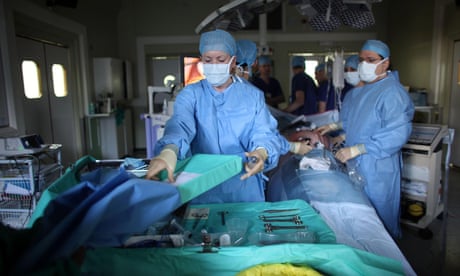On my morning drives to the hospital, the tears fell like rain. The prospect of the next 14 hours – 8am to 10pm with not a second’s respite from the nurses’ bleeps, or the overwhelming needs of too many sick patients – was almost too much to bear. But on the late-night trips back home, I’d feel nothing at all. Deadbeat, punch-drunk, it was utter indifference that nearly killed me. Every night, on an empty dual carriageway, I had to fight with myself to keep my hands on the steering wheel. The temptation to let go – of the wheel, the patients, my miserable life – was almost irresistible. Then I’d never have to haul myself through another unfeasible day at the hospital.
By the time I neared the end of my first year as a doctor, I’d chosen the spot where I intended to kill myself. I’d bought everything I needed to do it. All my youthful enthusiasm for healing, big dreams of saving lives and of making a difference, had soured and I felt an astronomic emptiness. Made monumentally selfish by depression, I’d ceased even to care what my husband would think of me, or that my little boy would grow up without his mother.
Doctor suicide is the medical profession’s grubby little secret. Female doctors aretwice as likely as the general population to take our own lives. A US study shows our suicide rate appears higher than that of other professional groups, with young doctors at the beginning of their training being particularly vulnerable. As I wrestled silently with the urge to kill myself, another house officer in my trust went right on and did it. To me, that monstrous waste of young life seemed entirely logical. The constant, haunting fear of hurting my patients, coupled with relentless rotas at work, had rendered me incapable of reason.
Though we know large numbers of doctors kill themselves, what is less clear are the reasons why, when dedicated to preserving human life, some doctors silently plot their own deaths. A 2006 study at the University of Pennsylvania identified that during their first year as doctors, young physicians experienced skyrocketing rates of burnout, with symptoms of emotional exhaustion, depersonalisation, and reduced sense of personal accomplishment soaring from 4% to 55%.
For me, the explanation ran deeper. I was entrenched in a hospital system that brutalised young doctors. Working on my hospital’s surgical emergency unit, there were simply too few of us to cope with the daily onslaught of patients. Officially eight or 10-hour days ran routinely into 13, 14 or 15 hours as we house officers worked at fever pitch to provide what was, at best, a mediocre service for our patients. Run ragged, we fought to keep our patients safe, but their numbers outstripped ours 20 or 30 to one, and the efforts this took were superhuman. The nurses knew, the consultants knew, even the hospital management knew, yet no one seemed to give a damn.
It wasn’t just exhaustion that drove me into depression. Plenty of jobs are busy. But there is something uniquely traumatic about being responsible for patients’ lives, while being crushed under a workload so punitive it gives neither the time nor space for safe assessment of those patients. Days were bad enough, but nights on call were terrifying. I remember running from the bed of one patient, still haemorrhaging blood from her surgical wound, to another whose heart rate had plummeted to 20, perilously close to a cardiac arrest. Two stricken patients, but only one doctor, wracked with the knowledge that if something went wrong, the guilt would be hers alone.
I was lucky. I was pushed by the colleague in whom I finally confided into seeking professional help. It took anti-depressants, therapy and a narrowly-avoided psychiatric inpatient admission to bring me back to the land of the living.

Now, on the cusp of junior doctors’ first national strike in 40 years, I’m astounded the health secretary persists in ignoring unanimous condemnation of his new contract from juniors and medical leaders alike. If he gets his way, Jeremy Hunt will make it easier for hospitals to abuse their juniors, by stripping away the safeguards that stop hospitals overworking us, fining those that do. Under his new contract, our hours will become even longer, even more antisocial – at a time when we simply have nothing more to give. And as we are pushed to treat more and more patients, faster and faster, fatigue and psychological distress will dull our competence: your lives will be less safe in our hands. And our own? Take it from someone who’s been there. Watch the suicide rate climb.
No comments:
Post a Comment